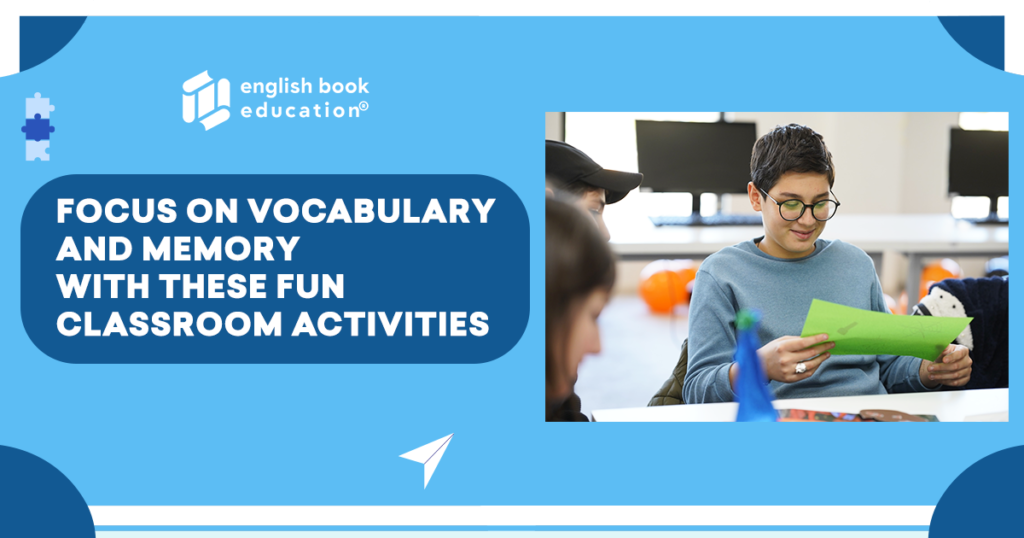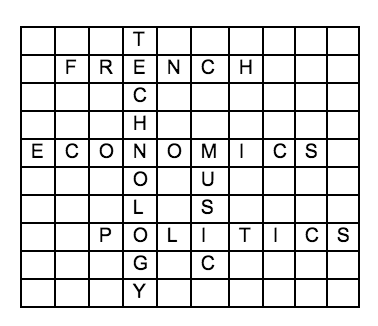
Author: Vaughan Jones
Focus on vocabulary and memory
All learning is remembering said Plato… er… or was it Socrates? I forget. Anyway, I’m sure all of us agree that memory plays a central role in learning a foreign language and in particular, learning new words. The first two thousand are easy. As research tells us, approximately 80% of almost any text in English is made up of the 2,000 most frequent words. Students meet these words repeatedly whatever they read or listen to, and whether they like it or not. And presumably they like it. Why? Because we know that repeated exposure is vital for long-term memorisation, so it effectively means that the first 2,000 words come ‘for free’!
But what about the next thousand, and the thousand after that? Researchers suggest that a student probably needs to know about 5,000 words to pass the Cambridge First Certificate Exam and maybe upwards of 10,000 to be considered genuinely C2 level on the CEFR scale. (Just for reference, an educated native speaker will probably have a passive vocabulary of around 20,000 words.) What can we do to help our students learn the thousands of less frequent words in the English language? It’s not easy, that’s for sure. There is no magic bullet. But here are some thoughts based on my own experience of nearly 40 years in the classroom.
Focus on the most useful words
Sounds obvious, doesn’t it? But time is always limited, so make sure that the words you are asking your students to learn are the most useful, which probably means the most frequent, for their particular stage in the learning process. Usually your coursebook will do this for you. Vocabulary selection in the different levels of Focus is informed by the frequency criteria of the Global Scale of English. So, in level 1 you might teach ‘silly’ (A1), but you wouldn’t teach ‘preposterous’ (C1). That would be silly.
Focus on memorable first encounters
You never get a second chance to make a first impression. This is as true for words as it is for people. Encountering words for the first time in richly evocative, personalised, meaningful or unexpected contexts can help the memorisation process. The more neurological stimulation, the better.
Focus on teaching effective word-learning strategies
This should be an ongoing ‘learner training’ aspect of your teaching. Firstly, encourage students to expose themselves to as much English as possible outside the classroom: music lyrics, tweets, blog posts, vlogs, video clips, extensive reading and listening (including podcasts and spoken word), watching films and TV series with English subtitles. These are just a few obvious sources. Secondly, train students how to discover meanings and recognise correct usage: guessing from context; using dictionaries effectively or learning basic meanings of high frequency affixes. Finally, teach your students different ways of recording vocabulary. Encourage them to create paper or digital flash cards; introduce them to mnemonic systems such as the keyword method or simply explore more creative ways of noting words down. There are lots of ideas in the Word Store – a unique feature of the Focus series.
Focus on systematic recycling
As you can’t guarantee that words outside the top 2,000 will automatically reoccur at conveniently spaced intervals, it is your job to engineer systematic re-encounters with the new words that you teach. A coursebook like Focus incorporates frequent recycling of target vocabulary, but it’s never enough. Also, what about all that vocabulary you taught when, for whatever reason, the lesson took a different direction and you went ‘off-script’ and started scribbling words on the board that weren’t even in the coursebook? My own very low-tech solution to capturing all those words is to institute ‘Class Scribe’. Students take it in turns to be the class scribe. They are given a blank sheet of paper at the beginning of the lesson and their role is simply to record any new language that comes up. This ‘data’, along with the target vocabulary in my coursebook, becomes my learning corpus. Having a class scribe…
- provides a unique record of each lesson
- helps improve classroom dynamics
- can reveal learning styles and difficulties
Five vocabulary activities to focus on vocabulary and memory
So now I know which words I’ve taught, I can make sure that I recycle them at regular intervals. How do I do that? By equipping myself with a repertoire of tried and trusted 5 to 10-minute activities that can be used as lead-ins, warmers or fillers. Activities that require very little or no preparation and can be adapted to cover a wide variety of different lexical areas. Here are my favourite five:
1) Board bingo
Write down twelve to fifteen words you want to revise on the board. Ask the students to choose five of the words and write them down. When they’ve done that, tell the students that you’re going to read out dictionary definitions of the words in random order and that they should cross out their words if they think they hear the definition. When they’ve crossed out all five words, they shout Bingo! Make sure you keep a record of the word definitions you call out so that you can check the students’ answers.
2) Odd one out
An old favourite. Think of the vocabulary, pronunciation or grammar point you want to revise. Write five words on the board and ask students which one is the odd one out. The students then explain why. This usually relates to the meaning of the word so in the following example the odd one out is dog.
pink / red / dog / blue / yellow
However, you could have any criteria you like, say, number of syllables. In that case, the odd one out would be yellow. In fact, the more unexpected the criteria, the better. The important thing is that they’re looking at and thinking about the words you want them to revise.
3) Category dictation
Choose the language you want to review and devise a way of categorising it into preferably two categories. Write the category headings on the board and ask the students to copy them. Then dictate the words (10–12 maximum) slowly and clearly, and ask the students to write them down in the correct category. For example, say you want to revise jobs. Your categories might be jobs you do inside and jobs you do outside.
| Inside | Outside |
Then dictate the words: e.g. a farmer, an archaeologist, a surgeon, an au pair, a vet, etc. The students write down the words in the correct category. When you’ve dictated 10 or 12 words, ask students to compare their lists.
4) Scrabble
Choose a lexical set you want to revise. Students work in pairs. They’ll need a piece of paper, preferably graph paper with squares on. Choose a topic, for example, school subjects. Student A writes ‘Across’ words, and Student D writes ‘Down’ words. It’s a good idea to provide the first word across, and make sure that it’s a long one. Student D then adds another school subject down the paper from top to bottom. This word must intersect with the school subject written across the page. Student A then writes another school subject across that intersects with the school subject Student D has written down. Students continue taking it in turns to write in their words.

Students build up words like on a Scrabble board until they can’t think of any more school subjects. (You could make it into a game by saying that the last person to write a school subject is a winner.) Note that students must leave one square between each word – this is why it’s better and clearer to use squared paper.
5) Random Letters
This activity is good for revising any type of vocabulary. Ask the students to call out any seven letters from the alphabet. Write the letters scattered on the board. Then ask the students in pairs to think of a word beginning with each letter on the board. The most obvious criteria is to revise words from a specific lexical set that you have taught recently, e.g. jobs, clothes, food, animals, etc. Alternatively, you could simply ask them for words they’ve noted down in lessons over the past two weeks. Another possibility would be to find the most interesting words they can from the Student Book unit that you’ve just finished. If the lexical set you want them to revise is particularly rich, you could ask the students to think of as many words for each letter as they can in say three minutes: make it into a contest to find the most words.
It’s always worth spending time thinking about how you can help your students to learn words more efficiently and more effectively. Way back in the 1970s the linguist David Wilkins summed up the importance of vocabulary learning thus: ‘Without grammar very little can be conveyed, without vocabulary nothing can be conveyed’.
Source: Pearson
 Blog EBE English Book Education
Blog EBE English Book Education



